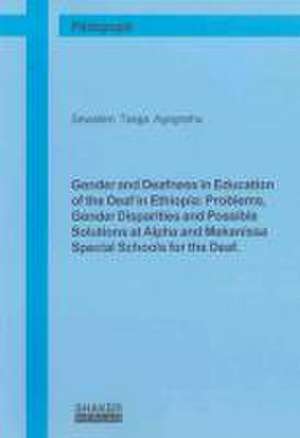Gender and Deafness in Education of the Deaf in Ethiopia: Problems, Gender Disparities and Possible Solutions at Alpha and Mekanissa Special Schools for the Deaf.
Autor Sewalem Tsega Agegnehuen Limba Engleză Paperback – 9 apr 2012
Preț: 211.93 lei
Nou
Puncte Express: 318
Preț estimativ în valută:
40.55€ • 41.84$ • 33.84£
40.55€ • 41.84$ • 33.84£
Carte indisponibilă temporar
Doresc să fiu notificat când acest titlu va fi disponibil:
Se trimite...
Preluare comenzi: 021 569.72.76
Specificații
ISBN-13: 9783844008272
ISBN-10: 3844008276
Pagini: 208
Ilustrații: 15 farbige Abbildungen
Dimensiuni: 152 x 211 x 20 mm
Greutate: 0.29 kg
Editura: Shaker Verlag
ISBN-10: 3844008276
Pagini: 208
Ilustrații: 15 farbige Abbildungen
Dimensiuni: 152 x 211 x 20 mm
Greutate: 0.29 kg
Editura: Shaker Verlag
